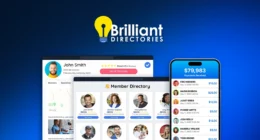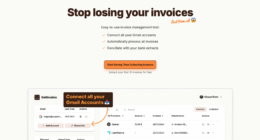For small businesses in India, popular CRM solutions include Zoho CRM, Freshsales, and LeadSquared, which offer essential features like contact management and automation at competitive prices. Zoho CRM starts at INR 720/month, while Freshsales begins at Rs. 719 per year, both providing user-friendly interfaces and mobile accessibility. Indian platforms offer localized features like GST compliance and regional language support, making them particularly suitable for domestic operations. The right choice depends on specific business needs, scalability requirements, and budget considerations.
Quick Overview
- Zoho CRM is the top choice for Indian small businesses, offering customizable features starting at INR 720/month with local support.
- Freshsales provides AI-powered lead scoring and affordable pricing at Rs. 719 yearly, making it ideal for budget-conscious businesses.
- Agile CRM’s free plan for up to ten users makes it an excellent entry-level option for small businesses.
- Local CRM platforms offer essential Indian business features like GST compliance and regional language support at competitive prices.
- Cloud-based CRM solutions increase customer satisfaction by 25% and sales productivity by 32% through automated processes.
Understanding CRM Software Benefits for Indian Small Businesses

Small business owners in India stand at a pivotal crossroads in today’s digital marketplace, where Customer Relationship Management (CRM) software has become a game-changing tool for growth and success. Research shows that implementing CRM solutions delivers multiple benefits for small businesses across various operational areas.
The impact of CRM is significant and measurable. Businesses report a 25% increase in customer satisfaction through personalized communication and better service delivery. Sales productivity rises by 32% thanks to streamlined processes and automated tasks. Additionally, CRM systems enable data-driven decision-making through real-time analytics and exhaustive reporting features. The market shows promising growth potential with 18% annual growth rate projected for CRM adoption in India through 2025.
For budget-conscious Indian businesses, modern cloud-based CRM solutions offer cost-effective options that scale with company growth, eliminating the need for expensive infrastructure while improving operational efficiency across departments.
Top-Rated CRM Solutions Available in India
After recognizing the value of CRM systems, Indian business owners need reliable software options that align with their specific requirements. The Indian market offers several top-rated solutions that cater to various business needs. Modern CRM solutions help businesses achieve improved customer service through better interaction tracking and management.
Leading options include Zoho CRM, which provides customizable modules starting at INR 720/month, and Freshsales, an India-developed solution featuring AI-powered lead scoring. LeadSquared stands out for its end-to-end sales solutions and quick implementation time. While Salesforce CRM offers powerful features and integrations, budget-conscious businesses might prefer Kylas CRM‘s fixed pricing plans or Agile CRM‘s free plan for up to ten users. SalezShark CRM delivers integrated sales and marketing automation with practical Outlook add-ons. Each platform offers unique advantages, allowing businesses to choose based on their specific needs and budget constraints.
Essential Features to Look for in Small Business CRM

When selecting a CRM system for small businesses in India, understanding the essential features becomes significant for making an informed decision. A well-chosen CRM should combine robust contact management, automation capabilities, and user-friendly interfaces to streamline business operations effectively. The system’s ability to scale with business growth while maintaining seamless integration with existing tools makes it a valuable investment for long-term success.
Contact and lead management features centralize customer data, enabling businesses to track interactions and maintain detailed customer profiles for better service delivery. Automation capabilities reduce manual workload through automated data entry, follow-ups, and marketing campaigns, increasing operational efficiency. Lead scoring capabilities help businesses identify and prioritize the most promising prospects based on engagement levels and potential value.
Customization options and mobile accessibility guarantee the CRM adapts to specific business needs while allowing team members to manage customer relationships on the go.
Cost Analysis and Pricing Models
Understanding the cost implications of CRM software stands as a major decision point for Indian small businesses seeking to implement customer relationship solutions. The market offers diverse pricing models to accommodate different business needs and budgets.
Small businesses can choose from several pricing structures:
- Subscription-based plans starting at ₹699 per user monthly
- Flat-rate options like Kylas at ₹12,999 monthly for unlimited users
- Freemium models from providers like Zoho CRM and Freshsales
- Per-user pricing suitable for smaller teams
- Custom solutions with modular add-ons
Small businesses facing budget constraints often struggle with recurring subscription fees that can strain their limited financial resources. Costs typically increase with:
- Additional features like AI and marketing automation
- Growing team sizes and user numbers
- Advanced customization requirements
- Integration with third-party tools
- Premium support services
Businesses should evaluate their specific needs against these pricing models to make cost-effective decisions.
Comparing Indian Vs International CRM Platforms

Throughout the Indian CRM marketplace, business owners face a critical choice between homegrown solutions and international platforms. Both options present distinct advantages, with Indian CRMs offering localized features like GST compliance and regional language support, while international platforms provide advanced AI analytics and global scalability.
Indian CRMs excel in local market understanding, providing streamlined solutions for SMEs with simplified implementation and regional customer support. Effective business automation tools enable these platforms to reduce manual workload while maintaining local market relevance. Similar to email automation features found in leading marketing platforms, these systems help streamline customer communications and campaign management.
International platforms offer sophisticated tools and extensive third-party integrations, though at higher price points and with less localization.
The choice ultimately depends on business size, growth plans, and specific needs for local compliance versus global capabilities.
When selecting between these options, companies must carefully evaluate their current requirements while considering future scalability needs, budget constraints, and technical expertise levels within their organization.
Making the Right CRM Choice for Your Business Growth
Selecting the right CRM solution stands as a pivotal decision for small businesses aiming to accelerate their growth in India’s competitive market. When evaluating options, businesses should focus on key aspects that directly impact their operations and scalability.
For the best results, decision-makers should:
Strategic CRM selection requires leaders to carefully evaluate platform adoption, tool integration, growth potential, and comprehensive cost factors.
- Assess platform usability to guarantee quick team adoption.
- Review integration capabilities with existing business tools.
- Consider long-term scalability as the business expands.
- Evaluate total ownership costs, including training.
Popular choices like Zoho Bigin offer cost-effective solutions starting at $7/user/month, while LeadSquared provides robust customization options. Implementing a CRM with task automation capabilities can significantly boost team efficiency by eliminating repetitive manual processes. For businesses requiring thorough features, Salesforce Essentials delivers advanced functionality despite higher costs. The key is matching CRM capabilities with specific business needs while maintaining a balance between functionality and budget constraints.
Frequently Asked Questions
How Long Does It Take to Implement and Train Staff on CRM Software?
CRM implementation typically takes 2-8 weeks for small businesses, while staff training requires an additional 1-4 weeks. The timeline varies based on several factors: system complexity, data migration needs, and business size.
Larger enterprises may need several months for full implementation. A phased approach, starting with core features and expanding gradually, proves most effective. Role-based training sessions, coupled with interactive demos and ongoing support, guarantee successful adoption.
Can I Migrate Existing Customer Data From Spreadsheets to the New CRM System?
Migrating multiple spreadsheets successfully to a new CRM system is entirely possible and practical. Most modern CRM platforms offer built-in import tools that support common file formats like CSV and Excel.
The process involves four key steps: preparing data by cleaning and standardizing formats, mapping fields correctly between sources, importing in manageable batches, and validating the transferred information.
With proper planning and CRM-specific tools, businesses can transfer their existing customer data seamlessly.
What Happens to My Data if I Decide to Switch CRM Providers?
When switching CRM providers, businesses maintain ownership of their data and can typically export it completely.
Most CRM platforms offer built-in export tools to transfer:
- Customer contact information
- Sales records
- Communication history
- Analytics data
The process usually involves downloading data in standard formats like CSV or Excel files.
It’s important to review the original provider’s terms of service and guarantee a complete backup before migration.
Many new CRM providers also offer migration assistance.
Do These CRM Solutions Work Offline When Internet Connectivity Is Poor?
Like a swiss army knife that works without batteries, modern CRM solutions are designed to function offline effectively. When internet connectivity is poor, these systems allow users to update customer records, generate invoices, track leads, access stored data, and create reports.
The data automatically syncs when connectivity returns. Leading CRMs like Zoho and Kapture offer robust offline capabilities through their mobile apps, ensuring business operations continue smoothly even in areas with weak internet signals.
Are There Any Hidden Costs Beyond the Advertised Subscription Fees?
CRM solutions often come with several hidden costs beyond the advertised subscription fees. Common unexpected expenses include customization charges, data migration fees, and integration costs with other business tools.
Companies typically face additional charges for extra users, premium support, and advanced features. Storage upgrades and training costs can also add up. As businesses grow, they may need to upgrade to higher-priced tiers to access essential functionalities or accommodate more users.
Conclusion
Like choosing the perfect spice blend for a curry, selecting the right CRM software requires careful consideration of your business’s unique flavor. For Indian small businesses, the ideal CRM solution balances cost-effectiveness, local market understanding, and essential features. Whether opting for homegrown platforms or international solutions, the key is finding software that aligns with your growth trajectory while maintaining simplicity in daily operations.







